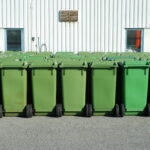The Intercontinental Hotel in Boston has a range of green initiatives that include everything from an extensive recycling program to a rooftop apiary. Recently, the hotel changed over 550 reading lamps in their guestrooms and contacted the RecyclingWorks hotline for advice on what to do with the old fixtures. RecyclingWorks connected the Intercontinental Hotel with…
The Massachusetts Surplus Property Program helps connect extra equipment, materials, and supplies to entities that can put them to use. State departments periodically declare surplus property which is offered first to other state entities free of charge. After 30 days, any property that has not been claimed is offered to cities and towns for a…
A Boston Magazine article recently highlighted the work of Food For Free, a Cambridge-based non-profit, collects unused food from farmers’ markets, grocery stores, bakeries, and universities and donates it to food pantries, schools, and individuals in need of healthy food. Sasha Purpura, executive director of Food For Free, says “Our mission is to address hunger…
The National Restaurant Association’s (NRA) Conserve program is a resource to explore and learn about sustainability in the restaurant business. To promote the program, the NRA developed 4 tips from industry experts on easy practices to implement that enhance a restaurant’s sustainability and produce environmental benefits: Recycle your cardboard Conserve water by establishing a…
This blog post from Spoiler Alert, a company based in Cambridge (MA) that has an “app” for connecting generators of surplus food to food recovery organizations, provides a visualization of food waste generation throughout the state and within the Boston metropolitan region. Staff at Spoiler Alert utilized publicly available food waste generation data from the state of…
This press release from the United States Environmental Protection Agency (US EPA) highlights thirteen New England organizations that have backed the Food Recovery Challenge, an initiative that encourages businesses, organizations and institutions to prevent food waste by donating or recycling food. The Massachusetts Department of Environmental Protection (MassDEP) is among the organizations who have become “endorsers” of…
This article from Cape News provides an excellent overview of a proposed anaerobic digestion facility at the Bourne landfill. The town sent an exploratory team to visit another facility operated by the same company, Harvest Power, and found that the operation produced little no no odor or noise that could be a problem for the town.
This article from the Patriot Ledger details the responses of several grocery chains to the Massachusetts Food Waste Ban. Stop and Shop, for example, is planning a product recovery center which will generate enough gas to power the chain’s regional distribution warehouse. The value of the ban legislation is underlined by the lack of opposition…
This article and video from Elite Daily highlights the creative ways that French Supermarket chain Intermarche has found to repurpose and market spoiled or unappealing fruits and vegetables. Watch the video to see how discounting ‘ugly’ fruits and vegetables became popular with their shoppers and has helped to utilize food that the producers would have otherwise…
The Boston Public library recently posted several items of furniture for free on the Reuse Marketplace, a regional network to exchange reusable and surplus items. These items are being offered only to governmental entities and nonprofits. Check out these FREE items of furniture: AV Stands Atlas Stands Metal Folding Chairs

